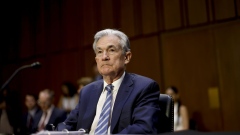Sep 15, 2020
Wall Street fears an election with no clear winner
, Bloomberg News
'If Biden is elected president you will see an improvement' in U.S.-Canada ties: Former ambassador
There is a high probability that the U.S. elections this November are going to be a mess. There are a range of scenarios for market participants to consider that were once unthinkable. What happens if President Donald Trump loses and doesn’t concede? Or if challenger Joe Biden loses and doesn’t concede? Or if Trump again wins via the electoral college but not the popular vote, setting off civil unrest the likes of which the country has never seen?
Those aren’t the only scenarios. My personal favorite involves the counting of mail-in ballots, which are likely to set a record by far. Democrats generally lean toward mostly voting by mail amidst the pandemic, while Republicans tend to favor voting in person at polling stations. It is probable that Trump has a commanding lead on election night, which dwindles over the following weeks as the mail-in ballots are counted. Imagine what the political environment would be like under that scenario.
I have no particular call as to who will win the election, but as it pertains to markets, it is less about the outcome of the election and more about the process. For me, the issue with mail-in ballots isn’t the potential for fraud, it’s that they take so long to count. The world will laugh at the U.S. when Nov. 3 comes and goes and there is no declared winner -- possibly for weeks.
We’ve learned that investors have placed hedges in advance of the election designed to protect a portfolio against rapid declines. Typically, this is in the form of buying plain vanilla put options on a broad market index, but can also involve more complex hedging strategies. Hedging activity is evident in the prices of futures on the CBOE Volatility Index, or VIX, where October VIX futures (the ones covering the election) are significantly higher than the surrounding contracts. (I placed a hedge on the election a few months ago. )
The hedges have become quite popular, leading to an increase in aggregate levels of implied volatility. Bloomberg News reports that this election is being priced as the most-expensive event risk on record based on a common way to bet on volatility. And what’s really unusual is that volatility has risen as stocks have gone up, which doesn’t happen very. Part of it is due to election hedging.
History shows that when a trade becomes excessively crowded, it is unlikely to work as intended. Consider if every hedge fund bought put options on a broad market index ahead of the election. If stocks were to go down as anticipated, the hedge fund community would sell the protective put options, which would have increased in value, but the act of closing out the hedges would cause the stock market to go higher. In other words, if everyone is expecting the market to go down, it is going to be very difficult for the market to go down on a sustained basis. This would lead to the type of paradox that we’ve seen in recent years, where you have a negative exogenous event—and stocks actually go higher.
The election hedgers aren’t protecting against an adverse outcome of the election. (There is a general sense that Biden, who is ahead in most major polls, and his proposed tax increases would be bad for the economy and markets.) What hedgers are preparing for is a complete breakdown in the electoral process and a Constitutional crisis. And what if the Supreme Court gets involved, like in 2000? Back then, the stock market was already in the throes of the dot-com bust, but the uncertainty around the electoral results put continued pressure on stocks throughout the fourth quarter of that year.
That whole episode will look downright civilized compared to what may be in store come November. Of course, any given presidential election can result in adverse and unintended outcomes. The difference this time is the perceived intransigence of the candidates and the hyper-partisan political backdrop, which has included persistent protests and rioting over the last few months. It’s possible that the election is a disaster of thermonuclear proportions.
It is also possible that it results in the stock market going up. After all, it has posted an epic rally during a global pandemic. The question for investors is, if there is an adverse event in our future, and the date that it may happen is widely known, will it actually have an impact on the market? You can’t schedule volatility. Volatility comes with surprises, like in March when the market was shocked by the advent of the global pandemic.
Investors have spent most of the year trying to figure out why the stock market is so good when the economy is so bad. Imagine the cognitive dissonance that is going to happen in two months.
This column does not necessarily reflect the opinion of the editorial board or Bloomberg LP and its owners.
Jared Dillian is the editor and publisher of The Daily Dirtnap, investment strategist at Mauldin Economics, and the author of "Street Freak" and "All the Evil of This World." He may have a stake in the areas he writes about.




